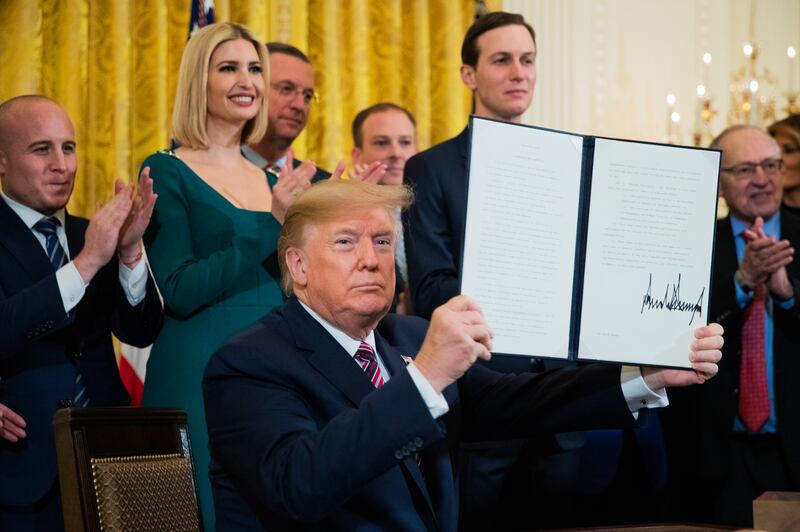SALT LAKE CITY — President Donald Trump’s new executive order aimed at rooting out anti-Semitism on college campuses doesn’t significantly change existing policy.
So why is it controversial?
The answer lies more in the administration’s track record on Jewish issues than in the brief order, which was signed Wednesday at a White House Hanukkah reception. Many reactions to the new guidelines directly referenced Trump’s past actions, either as proof of his long-standing support for Jews or evidence of bad intentions.
For example, Rabbi Jack Moline, president of the Interfaith Alliance, cited the president’s recent use of anti-Semitic tropes in his statement criticizing the executive order. Trump has repeatedly weaponized Jewish concerns in the service of his own agenda, he said.
“This administration uses anti-Semitism as a shield to ostracize others, squash dissent and bolster political support for Israel. And that will only backfire against the Jewish community,” said Rabbi Moline.
The Republican Jewish Coalition, on the other hand, paired their praise for the new guidelines with a reflection on all the good they say Trump has done for their community.
“We have very good reasons to call Donald Trump the most pro-Israel president in American history. He has shown his friendship for our wonderful ally, the state of Israel, again and again,” said the coalition’s chairman, Norm Coleman, in a statement.
What Rabbi Moline, Coleman and members of their respective camps agree on is that Trump has been very active on issues of concern to the Jewish community. They clash over who his notable statements and decisions were designed to please.
Since taking office, Trump has moved the U.S. embassy in Israel from Tel Aviv to Jerusalem, condemned Democratic politicians for using anti-Semitic language and changed government policy to express support for Israeli settlements in the West Bank.
In the new executive order, the Trump administration takes aim at anti-Semitism on college campuses, instructing government agencies to be as active in rooting it out as they are in addressing other forms of unlawful discrimination.
The “administration is committed to combating the rise of anti-Semitism and anti-Semitic incidents in the United States and around the world,” the document reads.
The order centers on Title VI of the 1964 Civil Rights Act, which “prohibits discrimination based on race, color or national origin in programs or activities receiving federal financial assistance,” according to the U.S. Department of Education.
The New York Times’ initial report on the order said it would “effectively interpret Judaism as a race or nationality,” since it wouldn’t add religion as a protected characteristic. But policy experts have since said the new guidelines don’t go that far.
Instead, the document affirms an interpretation of Title VI first presented by the Obama administration: that many acts of religious discrimination can also be viewed as race or ancestry-based.
“Groups that face discrimination on the basis of actual or perceived shared ancestry or ethnic characteristics may not be denied protection under Title VI on the ground that they also share a common faith,” reads a 2010 Dear Colleague letter from the Department of Education.
Jewish groups generally support such an interpretation, and some have spent years advocating for Congress to update the Civil Rights Act.
Trump should be praised for the executive order, even if he’s wrong on Israel-related issues more often than not, said David Krone, who fought for the policy change while serving as chief of staff to Sen. Harry Reid, to The New York Times.
“I know people are going to criticize me for saying this, but I have to give credit where credit is due,” he said.
Other liberal Jews were less supportive. Trump’s problematic actions in the past, such as when he described Jews who vote for Democrats as “disloyal” to Israel, make it more likely that he will abuse this executive order moving forward, they said.
“We must be careful to distinguish legitimate criticism of Israel from free speech protected by the First Amendment. Any overreach by the administration in the enforcement of this executive order could chill protected speech, making it even harder to fight legitimate anti-Semitism,” said Halie Soifer, executive director of the Jewish Democratic Council of America, in a statement.
The Trump administration has already faced criticism for using an overly broad interpretation of anti-Semitism. In September, education officials told Duke University and the University of Norther Carolina at Chapel Hill that their shared Middle East studies program needed to be updated to include a more positive portrayal of Jewish beliefs, as The New York Times reported at the time.
Moving forward, the Trump administration should focus on better understanding the sources of anti-Semitism, rather than simply calling attention to it when it’s politically convenient, Soifer and others said.
“We feel it is misguided and harmful for the White House to unilaterally declare a broad range of nonviolent campus criticism of Israel to be anti-Semitic, especially at a time when the prime driver of anti-Semitism in this country is the xenophobic, white nationalist, far-right,” said Jeremy Ben-Ami, the president of J Street, in a statement.


